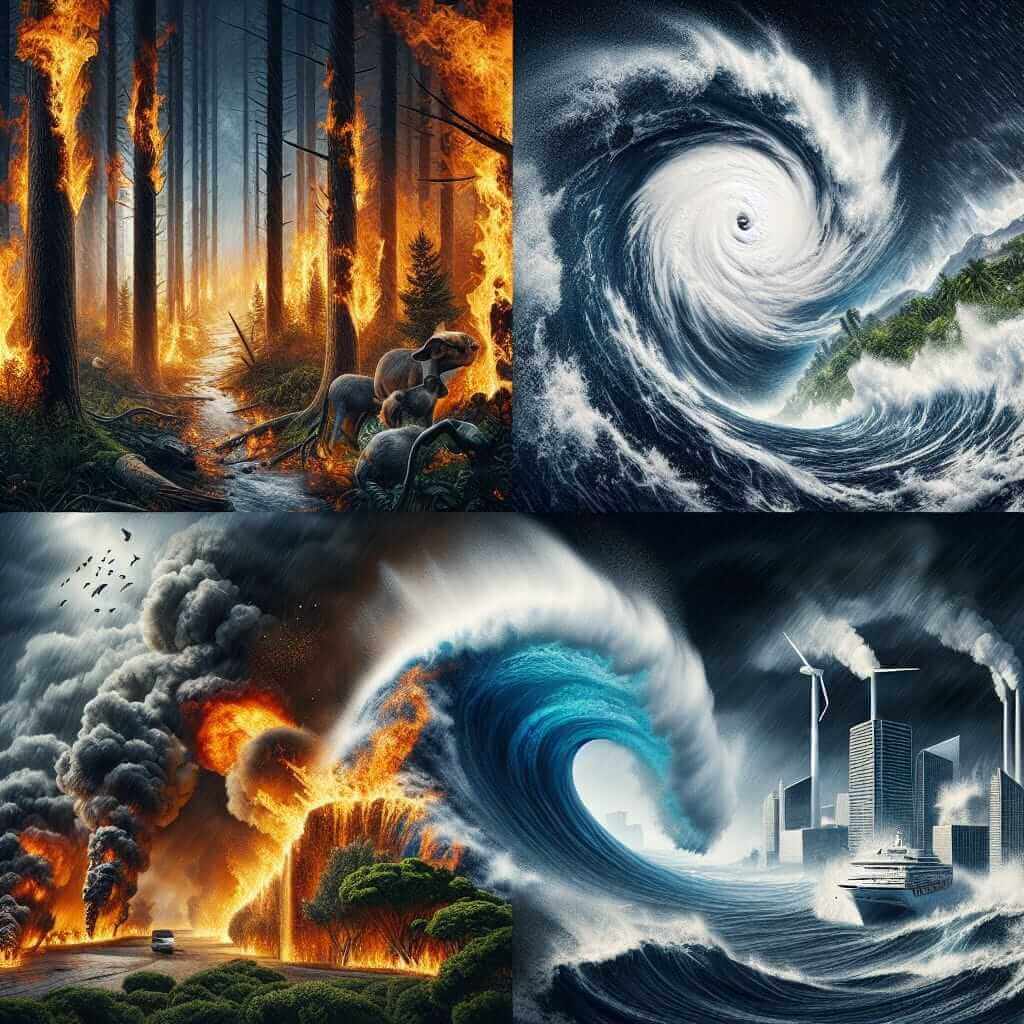Climate change and its effects on natural disasters is a prevalent topic in IELTS Writing Task 2 exams. The frequency and magnitude of disasters such as hurricanes, floods, and wildfires have significantly increased over the past few decades. These issues make for compelling essay topics, challenging candidates to discuss the causes, effects, and potential solutions. Below are some sample essay prompts related to this crucial subject:
- Some people believe that climate change is the primary reason for the increase in natural disasters. To what extent do you agree or disagree?
- Discuss the various ways in which climate change has impacted the frequency and intensity of natural disasters. What measures can be taken to mitigate these effects?
- How does climate change contribute to the escalation of natural disasters, and what are the possible repercussions for human life and the environment?
Choosing a Sample Essay Prompt
Let’s choose the first prompt for a detailed essay analysis:
Prompt: Some people believe that climate change is the primary reason for the increase in natural disasters. To what extent do you agree or disagree?
Analyzing the Prompt
This prompt asks you to discuss the causative role of climate change in increasing natural disasters. You’ll need to present arguments either in support of, against, or balanced views regarding this statement.
Sample Essay
Introduction
Climate change is an ever-increasing global concern, significantly affecting weather patterns and prompting a surge in natural disasters. There is ongoing debate about whether climate change is the primary catalyst for this uptick in disasters. While some argue that other factors also play essential roles, substantial evidence supports the idea that climate change is indeed a predominant driving force.
Body Paragraph 1: Agreeing with the Prompt
To begin with, as global temperatures rise due to increased greenhouse gas emissions, the planet experiences more extreme weather conditions. For instance, warmer ocean temperatures fuel the intensity and frequency of hurricanes and typhoons. A report by the National Oceanic and Atmospheric Administration (NOAA) reveals that the number of Category 4 and 5 hurricanes has nearly doubled over the last 30 years, directly correlated with rising sea surface temperatures.
Body Paragraph 2: Supporting Data and Additional Impacts
Moreover, climate change leads to severe droughts and increased temperatures, significantly contributing to wildfires. In Australia, the 2019-2020 bushfire season burned over 18 million hectares, attributed largely to prolonged heatwaves and dryness exacerbated by climate alterations. Similarly, in California, extended dry periods have turned forests into tinderboxes, waiting for a spark.

Body Paragraph 3: Acknowledging Other Contributing Factors
However, it is essential to recognize that while climate change is a significant contributor, it is not the sole factor behind the rise in natural disasters. Human activities such as deforestation, urbanization, and poor land management also escalate these events. For example, the deforestation of the Amazon rainforest not only contributes to global warming but also disrupts natural water cycles, leading to more frequent flooding.
Conclusion
In conclusion, while various factors contribute to the increase in natural disasters, climate change remains a primary catalyst. Its pervasive impact on weather patterns, temperature, and environmental conditions make it an undeniable driving force behind the surge in these catastrophic events. Mitigating climate change through global cooperation and sustainable practices is crucial to reducing the frequency and intensity of future natural disasters.
Word Count: 299
Tips for Writing Essays on This Topic
- Vocabulary: Utilize specific terminology related to climate change and natural disasters, such as “greenhouse gas emissions,” “sea surface temperatures,” and “deforestation.”
- Grammar Structures: Employ complex sentences and various grammatical structures, such as cause-and-effect sentences (e.g., “As global temperatures rise, the planet experiences more extreme weather conditions.”) and concessive clauses (e.g., “While some argue that other factors also play essential roles, substantial evidence supports the idea that climate change is a predominant driving force.”)
- Coherence and Cohesion: Ensure that each paragraph logically follows from the previous one and utilizes linking words and cohesive devices.
Vocabulary List
- Greenhouse gases (noun) /ˈɡriːn.haʊs ɡæs/: Gases that trap heat in the atmosphere.
- Typhoons (noun) /taɪˈfuːnz/: A type of tropical cyclone occurring in the western Pacific or Indian oceans.
- Bushfire (noun) /ˈbʊʃ.faɪər/: An uncontrolled fire in the bush; the Australian term for wildfire.
- Drought (noun) /draʊt/: A prolonged period of abnormally low rainfall.
- Heatwave (noun) /ˈhiːtˌweɪv/: A prolonged period of excessively hot weather.
- Urbanization (noun) /ˌɜː.bən.aɪˈzeɪ.ʃən/: The process through which cities grow, and higher population densities become more urban.
- Deforestation (noun) /diːˌfɒr.ɪˈsteɪ.ʃən/: The clearing of trees, transforming a forest into cleared land.
- Mitigation (noun) /ˌmɪtɪˈɡeɪʃən/: The action of reducing the severity, seriousness, or painfulness of something.
- Wildfires (noun) /ˈwaɪld.faɪər/: Uncontrolled fires that occur in wildland areas.
Conclusion
Discussing the correlation between climate change and natural disasters is not only relevant for improving your IELTS Writing Task 2 skills but also indispensable for raising awareness of a crucial global issue. By incorporating specific vocabulary, utilizing advanced grammar structures, and maintaining coherent arguments, you can achieve a high band score while addressing this pressing topic. Happy writing!
For more practice, consider these topics:
- How can clean energy sources mitigate the effects of climate change? (Related article: The Importance of Clean Energy in Combating Climate Change)
- Discuss the impact of climate change on global migration patterns. (Related article: The Impact of Climate Change on Migration Patterns)
- What are the health implications of climate change worldwide? (Related article: The Effects of Climate Change on Global Health)
By understanding and practicing these themes, you can further hone your writing skills for the IELTS exam.